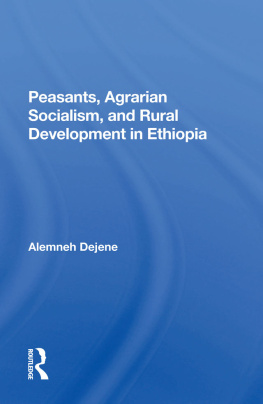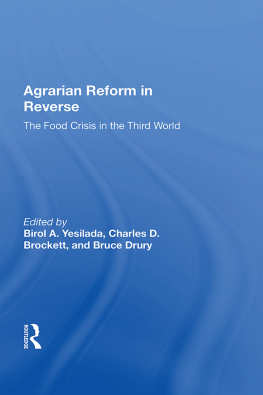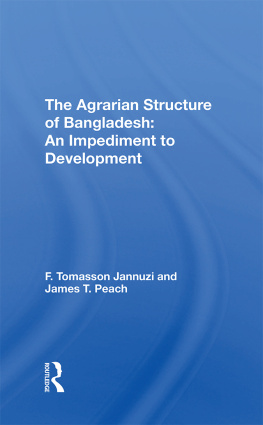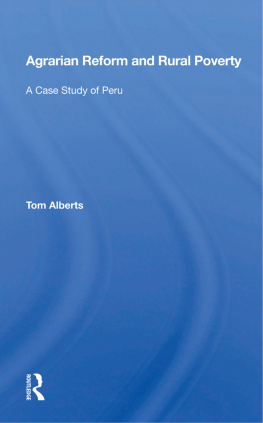Peasants, Agrarian Socialism, and Rural Development in Ethiopia
About the Book and Author
One of the few systematic field surveys undertaken following the 1975 agrarian reform in Ethiopia, this study analyzes the conditions constraining agricultural productivity of peasant farmers in the Arsi region and examines how farmers view peasant and government organizations established to attain agrarian socialism. Based on data generated through interviews with fanners, peasant association leaders, and extension agents, Dr. Dejene argues that the low prices for agricultural products, shortages of consumer goods, and lack of improvements in farming technology are among the major obstacles to increasing output among peasant farmers. The author also explores the government policy of transforming peasant associations into collective fanning units, which he finds is supported by only one quarter of the farmers interviewed. His study indicates that peasant institutions could best mobilize labor and resources to generate agricultural surplus and undertake conservation activities that would prevent future famine. Thus the author concludes that present government efforts should emphasize strengthening the cooperative movement rather than establishing collective farming.
Alemneh Dejene is a post-doctoral fellow at the W.E.B. DuBois Institute for Afro-American Research, Harvard University.
Peasants, Agrarian Socialism, and Rural Development in Ethiopia
Alemneh Dejene
First published 1987 by Westview Press, Inc.
Published 2019 by Routledge
52 Vanderbilt Avenue, New York, NY 10017
2 Park Square, Milton Park, Abingdon, Oxon OX14 4RN
Routledge is an imprint of the Taylor & Francis Group, an informa business
Copyright 1987 Taylor & Francis
All rights reserved. No part of this book may be reprinted or reproduced or utilised in any form or by any electronic, mechanical, or other means, now known or hereafter invented, including photocopying and recording, or in any information storage or retrieval system, without permission in writing from the publishers.
Notice:
Product or corporate names may be trademarks or registered trademarks, and are used only for identification and explanation without intent to infringe.
Library of Congress Catalog Card Number: 86-51527
ISBN 13: 978-0-367-28257-8 (hbk)
To the Ethiopian peasantry, who deserve a better life and a greater autonomy in shaping their destiny
The publicity about the famine in Africa and in Ethiopia touched a common chord in human consciousness. It resulted in an outpouring of compassion from the world community revealing an elevated aspect of humanity that sees starvation in a world of plenty as an affront to everyone. Nevertheless, beyond these noble but piecemeal efforts lies the crucial task of making a concentrated and sustained effort to look into the long-term solution of world hunger.
Dr. Alemneh Dejene's book, Peasants, Agrarian Sodalism, and Rural Development in Ethiopia, presents thoughtful suggestions that assist in finding such long-term solutions to attain agricultural self-sufficiency in Ethiopia. His study is conducted in Arsi, one of the few surplus producing regions where the Swedish International Development Authority (SIDA) has financed the first integrated rural development projects in Ethiopia. His study is one of the few systematic field surveys conducted after the 1975 Agrarian Reform in Ethiopia. Dr. Dejene has undertaken an exacting task of generating, analyzing, and interpreting original data. He has succeeded in presenting the data in an instructive and insightful way that makes his study valuable for both academicians and practitioners involved in rural development
Dr. Dejene's study addresses some of the pertinent problems that constrain peasant farmers' production. These problems have also been of concern to SIDA and include insecurity of tenure, inefficiency in the present marketing and distribution system, ineffectiveness of the extension system in disseminating improved innovations to individual households at the village level, and heavy investment in promoting collective forms of production at a stage when most farmers are unaware of the benefits of collective efforts. The findings have national implications since Arsi has been an experimental ground for new ideas and innovations, and farmers in Arsi tend to be more progressive than those in other regions in Ethiopia.
Dr. Dejene suggests that the most viable strategy to overcome these obstacles and increase peasant production is to capture and maximize the potential created by the Agrarian Reform. This potential lies mainly in the peasant institutions, particularly the service cooperatives, which could serve as vehicles to promote the cooperative movement, to bring rapid rural development and the gradual social transformation of the rural sector. Moreover, the cooperatives could generate an investable surplus in the peasant sector.
As demonstrated in Arsi, peasant associations and service cooperatives have the capacity to generate a surplus capital through labor and resource mobilization. These peasant institutions have pooled labor to build schools, clinics, and infrastructures, and have undertaken conservation practices that include soil and water management and reforestation to prevent future famine. Service co-operatives are promoting production and income-generating enterprises such as flour mills, dairy farms, and cottage industries. In addition, the majority of service cooperatives have assumed the task of input distribution and credit management formerly carried out by the extension service. They have also shown the potential to have an increased role in crop marketing and distribution of con sumer goods, which are presently dominated by government parastatals.
Dr. Dejene's study draws a distinction between the cooperative movement and the promotion of collective farming. The latter has been given primacy by the Ethiopian government on the assumption that large-scale collective farming is superior to small-scale farming. As a result, the cooperative movement, by and large, is viewed as a means of transforming peasant farming directly into a collective form of production, i.e., producer cooperatives. Dr. Dejene's caution against this policy is well founded given the present level of subsistence farming, lack of exposure to modem methods by the majority of farmers, and the experience of large-scale agriculture (under the Ministry of State Farms) in Ethiopia.
In all, Dr. Alernneh Dejene's book presents strategies on the issues that adversely affect peasant production. The solution, as he suggests, largely rests on having more faith in, and granting more autonomy to, peasant institutions. This would seem to be a very constructive suggestion for Ethiopian policy makers and outside donor agencies.
Johan Holmberg
Assistant Director General
Swedish International Development Authority
Stockholm, Sweden
Numerous people assisted me while I was undertaking this survey research in Ethiopia. The collaboration of extension agents, peasant association leaders, and peasants was vital in generating the data for this research. Mr. Aklu Girgre and Mr. Gizaw Negussie, Vice Ministers in the Ministry of Agriculture, and Mr. Debela Dinka, General Manager of ARDU, were most enthusiastic in supporting this research. I am grateful for their encouragement and support.






